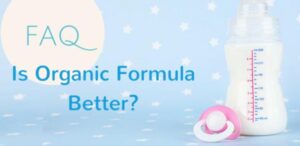If your baby has digestive issues you may know how uncomfortable it will make the baby. They may be fussy and may cry a lot due to the discomfort. To help with digestion you can give your baby organic formula. This formula is all-natural and no fertilizers, pesticides, or other harmful products will be used on any of the ingredients that go into making the formula. There are no hormones that go into any of the ingredients either.
Table of Contents
Is Organic Baby Formula Easier to Digest Compared with Other Types?
Free of Pesticides
The organic formula cannot be made with any products where pesticides were used. This will help reduce some side effects. One of the side effects on the baby is digestive issues. This organic formula should not have this or any similar side effect when it is fed to the baby.
No Hydrolyzed
When creating the hydrolyzed milk the protein in the milk needs to be broken down. While some babies can be helped with this most cannot digest the chemicals that are used in this process. The organic formula does not use any chemicals for this process that can upset the stomach or lead to other digestive issues.
Use of Prebiotics
The organic formula is made with a natural prebiotic mix. This will allow the baby to be able to digest the formula and will reduce digestive issues in the baby. This will help support the good bacteria in the digestive tract to reduce any pain or discomfort that the baby is feeling.
Close to Natural
Organic formula is as close to breast milk as possible. The organic formula contains Lactose which is the main carbohydrate that is found in breast milk. This is the main ingredient used in the organic formula. There is also a sensitive formula that will help a baby that is not able to handle the lactose. This lactose in the formula comes from cows that were also raised on an organic diet.
Reduced Issues
If a baby has gas or they suffer from bloating this can become very uncomfortable. These digestive issues can make the baby feel pain and they will cry until it is gone. The organic formula does not cause the gas buildup or bloating that a baby may be experiencing. This makes it easier to digest without any pain.
Different Verities
There are different types of organic formulas to meet the specific needs of the baby. Some formula has additional iron and some do not have much if the baby is not able to tolerate it. Some formulas are designed to have the same vitamins and nutrients as breastmilk. If a mother is not able to breastfeed than organic formula is the next best thing as it contains everything that a baby needs to be healthy.
If a baby is having digestive issues organic formula is a good alternative to other types of baby formulas. The organic formulas are all-natural and they will help support healthy digestive systems without any additive or chemicals that can irritate their delicate system.
Is Organic Formula Better for Children?
From leading a healthier life to being active, great nutrition will always be best for children. However, our concern is in the emergence and popularity of organic formula. Parents will often feed their children this formula, either out of necessity or by choice. Whichever it is, it will be vital to understand how beneficial it is.
Perhaps it would be right to mention that organic formulas are substitutes for natural breast milk. While they are synthetic, they usually come with certified organic ingredients. It is in this light that you will be confident of your child ingesting the right thing, and that which features no harmful chemicals. Remember, it is a product of either cow milk or soy.
Is organic formula better?
The answer to this question is hardly clear-cut. We have various proponents of this formula, while a few concerns float from time to time. An in-depth look into this will, perhaps, help you come up with a more informed decision in the long run.
Most proponents will indicate how healthy a choice this is. That it does not come with any harmful sweetener only implies that it will cause no health issues to your baby. Thanks to the fact that the product is not from cows that have eaten pesticide-treated grass, the formula is chemical-free.consider these benefits.
• Use natural sweeteners
The only sweeteners that have remained dominant are protein and lactose. With these elements, the organic formula becomes not only sweet but also nutritious. Most countries have banned the use of sugar in sweetening these formulas. We could attribute this to the rising concern of obesity and overeating among children.
• Healthy elements
Organic formula prides itself on a variety of healthy elements, including lutein, antioxidants, and proteins. Lutein comes in handy in improving the eyesight of your child, while antioxidants are vital in enhancing their general health. On the other hand, they come with very few heavy metals that could affect your child.
• More digestible
Did you know that organic formula is both complete and gentle on your baby? This product comes with no artificial ingredients. For this reason, it tends to be more digestible than the traditional formula. Remember, you will only get certified ingredients in this formula.
Above all, it will always be vital to be careful when selecting your organic formula. Aim at getting it from reputable brands. With this, you will hardly compromise the health of your baby at the end of the day. Here are a few tips to consider during this pursuit.
• Check the labels
Take the time to go through labels, as this will ensure you understand the content of the formula. Ensure that you avoid products that feature too much DHA and ARA elements.
• Contact manufacturer
Reach out to the manufacturer, as this will ensure that you understand what you want to buy into. Ensure that you ask everything that you are doubting.
• Confirm the bottle
Did you know that the FDA does not allow baby product bottles to have BPA? Ensure that it is so.
Today is the best day to get your child an excellent organic formula. Do not hesitate to do so.
What Should You Avoid In Organic Formula?
From enhanced digestibility to the absence of harmful chemicals, there is every reason for organic formulas to be popular. Various reputable brands have even stepped in to ensure that children get the best in the long run. Whether you consider this option out of necessity or personal preference, you are sure of enhanced safety.
However, it will always be vital for you to be relatively careful when selecting these formulas. That is because the presence of some elements could compromise the health of your baby. Here are a few things that you should avoid in the organic formula.
• Soybean oil
While soybean oil is relatively affordable and common in many processed foods, it is less suitable for children. We could attribute this to the fact that it will mostly come from GMO sources, making it an unstable oil for the child. The trans fats it produces will always make the baby sickly in the long run.
• Gluten
Gluten is a bread-based grain protein found in many foods, including wheat, barley, and rye. The presence of this element is not ideal for babies, as most of them are allergic to it. Digesting this gluten is relatively hard for most children, at least in the first year.
• Arsenic
This chemical is relatively prevalent in foods such as oatmeal and rice. However, once you note it in organic baby formula, avoid it. The baby could end up developing cancer upon too much consumption of this element. While at it, you will find it valuable to avoid rice-based formulas also.
• Palm oil
While an adult could be tempted to take palm oil at any time, it is not the best for a baby. Most children will find it hard to digest this oil. That is because it reacts with the calcium in the stomach, which leads to hard stools. The baby is also likely to end up with a lower bone mass in the long run.
• Corn Maltodextrin
This product could come in handy as a sweetener for most organic formula companies. However, there is a high chance that it comes from GMO sources, which exposes the child to harmful chemicals. If your chosen formula comes with it, avoid it.
• Aluminum
Aluminum is a heavy metal that could expose your baby to neurological issues in the future. Most countries have limited this element in the organic formula. Whenever you note it, it would only be fair that you avoid the product.
• Nanoparticles
Nanomaterials are engineered particles that could have a significant effect on your child in the long run. The presence of these particles in the organic formula makes the child vulnerable to DNA damage, impaired immune cell function, and even inflammation. These particles could make the child weak or unhealthy during their whole life.
We cannot ignore how vital organic formula has become in our present-day society. However, unless you get things right, you will end up with an unhealthy child. Do not shy away from scrutinizing the ingredients of the organic formula, as it will cushion your child from fatality.
What Is Actually In Baby Formula?
Baby formula is milk that is very similar to mother’s milk but is made of materials known as the dairy substitutes. To come up with baby formula proteins, carbohydrates and fats are blended using the same equipment like those that manufacture dairy products.
Unlike breast milk, the formula is not 100% healthy for babies, especially if the products are not well mixed, it can even cause a baby to become ill. Baby formulas are of a different type, and each type is made of different materials.
Proteins
Proteins that are used in formulas come from soybeans and animal milk, nuts, fish, and cottonseed oil. When preparing soybeans simply soybeans in baking soda, drain them, grind the beans and ensure that the mixture is well diluted with water.
Fats and oils
Another important thing that is added to a baby’s formula is fats and oils; this substance is almost similar to breast milk because it’s fatty and breast milk has fatty compounds. There is something else known as diluents and is added to baby’s formula, for the case of milk-based formulas skim milk is used as diluents while for formulas that have no milk purified water is used as diluents.
Minerals
Minerals are also added on infant formulas and are very essential. These minerals include several things, for instance; iron, zinc, magnesium, chloride, calcium, sulfur, copper, potassium, sodium, chloride, and iodine.
Vitamins
Vitamins are also added to the formula, and these vitamins are; vitamins D, B12, A, C, and E. Other vitamins included are; niacin, thiamine, folacin, riboflavin, pantothenate, and pyridoxine. The reason why you must include vitamins in making baby formula is that they are known to increase the formula’s nutritional value.
Stabilizers
Stabilizers/ Emulsifiers are also included in a baby’s formula, and this is; mono and di-glycerides and thickeners such as gums and starch s. Emulsifiers ensure that oil and water-soluble components stay in place and do not separate in any case.
Infant formula is made in a way that is much likely to be similar to breast milk, but the difference is in the nutrient content. The most used baby formula is made of purified cow’s milk and casein that acts as a source of protein, a blend of vegetable oils which acts as a source of fat, lactose as a source of carbohydrate, vitamins and some other ingredients.
There are some other ingredients added to baby formula, but they are known to be very dangerous. Every time you are purchasing baby formula ensure that you check the ingredients used. The dangerous ingredients are known to affect the brain and the human reproductive organs.
These harmful ingredients have been discovered in some formulas, and therefore you need to be extra careful. It is advisable to breastfeed an infant rather than giving them formulas; formulas are not as good as breast milk in any way. However, there are some situations that will force you to use formulas, and this is only if the mother is suffering from HIV or has passed on.
What Ingredients Should I Avoid in Baby Formula?
Baby formula should have the safest ingredients ever because any harmful component will harm the infant. Most people tend to assume the ingredients of baby formula, not knowing that they can cause lifetime harm. Every time you are getting a baby formula, ensure that you check the baby formulas ingredients because it is essential.
However, there are several products you need to avoid in the baby formula because they are toxic, and several studies have proven that. Breastfeeding is best for babies unless otherwise. Here are some of the ingredients you should avoid.
Sucrose
This ingredient found in several formulas because it’s known to help babies digest the milk, but it has several problems. When a formula has excess amounts of these ingredients, it can cause childhood obesity and problems with dental, which is not good at all.
Soy
It is available in almost any kind of baby formula, it may appear to be harmless, but it is especially for babies. Soy is grown, and most of the time, they are sprayed with harmful chemicals like the weed killer or pesticides, and when consumed by an infant, it can cause serious problems.
Artificial DHA and ARA
These are fatty acids available in breast milk and are produced naturally, but for the formula, they are artificially made from algae and fungus, and of course, they are not good for human consumption. During the manufacturing process, hexane may be used, and it is known to cause problems in the nervous system of a consumer.
Dioxin
Most of you have heard of this substance that is well known to cause cancer. This product is hard to avoid because it is in several products and places. This should be avoided by everyone because it is harmful, and an infant can be born with it already from their mothers. No one likes to harm their children and therefore be keen on some of these things breastfeed your child when it is possible.
Preservatives
We all know that preservatives are added to a product so that it stays for long. These preservatives are found in both organic and normal formulas, and they are harmful for human consumption; they are known to create toxins in the body, which in turn causes vision and hearing problems in infants.
Synthetic nutrients
Manufacturers are doing there best to match up with breast milk, but during the process, they may end up adding some substances that are harmful. They use ingredients such as lycopene and L-Carnitine; these ingredients are toxic, but manufacturers are only after processing them in a much easier way, and that is by using harmful chemicals that cause harm to infants.
Children fed with toxic formulas are said to develop chronic diseases in their lifetime. Infants have a weak immune system unlike adults, and with this modern world, it is difficult to prevent exposure to harmful chemicals; adults can survive this, but infants can not.
Harmful chemicals do total harm to infants; it can even cause brain damage and stunted growth. When making the choice of your child’s nutrition it is good to learn a lot to avoid harming them.





